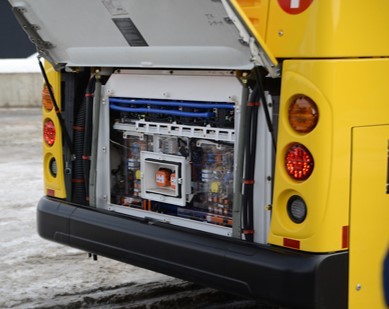Metro Transit Zero-Emission Bus (ZEB) Transition Plan
Under state statute, the Metropolitan Council is responsible for developing a Zero-Emission Bus and electric vehicle transition plan and revise the plan once every three years (Minn. Stat. 473.3927).
2025 ZEB Transition Plan Report
2025 Zero-Emission Bus Transition Plan [large PDF]
Past Transition Plan reports
2022 Zero-Emission Bus Transition Plan [PDF]
The Plan identifies short-term (present - 2030) and long- (beyond 2030) term opportunities, risks, and implementation strategies to transition Metro Transit's bus fleet to zero-emission technology.
According to Minnesota Pollution Control Agency 2018 data:
- The transportation sector in Minnesota accounts for about a quarter of all statewide greenhouse gas (GHG) emissions
- Buses (including school buses, transit buses, and intercity buses) account for 0.7% of transportation GHG emissions in Minnesota
The transition to zero-emission buses is one of many strategies Metro Transit intends to implement to make a meaningful impact on tackling climate change.
2024 ZEB Transition Plan Annual Report
Metro Transit hosted the annual Zero Emission Bus (ZEB) Transition Plan stakeholder update summit in January 2026. The 2024 annual report, containing the graphics and content presented at the annual update, is available below.
2024 ZEB Transition Plan Annual Report [PDF]
View a recording of the 2024 annual report presentation at the July 14, 2025, Transportation Committee meeting beginning around 1:41:20. Metro Transit will produce a report and host a Zero Emission Bus (ZEB) stakeholder summit annually.
Past annual reports
2023 ZEB Transition Plan Annual Report [PDF]
2022 ZEB Transition Plan Annual Report [PDF]
Timeline of Metro Transit sustainability initiatives
- 1991 First bus-only highway shoulder lanes reduce idling in rush-hour traffic
- 2002 First hybrid electric buses introduced
- 2007 Particulate matter trap filters introduced, reducing particulate matter emissions
- 2010 Diesel Exhaust Fluid introduced, reducing nitrous oxide emissions
- 2012 First solar and renewable energy sources begin to power buildings and facilities
- 2016 First non-revenue electric vehicles
- 2019 First battery electric buses begin service on METRO C Line
- 2023 North Loop Garage opened, designed to include electric bus charging equipment
- 2023 Federal Transit Administration (FTA) awarded Metro Transit $17.5M Low or No Emission grant
- 2023 Ordered five 60-foot battery electric buses and four bus storage chargers for METRO Gold Line
- 2024 Ordered 20 40-foot battery electric buses and 18 bus storage chargers and four maintenance mobile chargers for use on local routes with funding provided by the FTA's Low or No Emission grant and the Minnesota Department of Transportation
Three guiding principles and six supporting actions were established as the framework for the Transition Plan and for use in defining the definition of a successful transition to ZEBs. The guiding principles are Technical Viability, Equity and Environmental Justice, and Fiscal Impact.

Metro Transit engaged interested stakeholders and communities October to December 2021. Engagement included:
- Virtual stakeholder summit
- Public survey
- Outreach to frontline Metro Transit staff
- Presentations to Minneapolis and St. Paul neighborhood organizations
Participants ranked environmental and population characteristics in surveys and interactive polling at virtual summit and neighborhood presentations. This data is the basis of an Equity and Environmental Justice prioritization method which will assist in prioritizing areas for ZEB implementation.

ZEB Transition next steps
Milestones establish key targets and projections for the transition to ZEBs over a set period of time.
- Vehicle Procurement: Vehicle procurement measures the percentage of transit vehicle procurements that are ZEBs over a specific time horizon.
- Target: Between 2022 and 2030, at least 20% of Metro Transit’s 40-foot bus replacement procurements will be electric.
- Projection: Provided in future updates based on realized experience in the short term and industry advancements.
- Continued ZEB Transition Plan Outreach – Metro Transit will continue to conduct outreach to stakeholders including progress updates and future plan updates. If you have questions about the ZEB Transition Plan, please contact Julie Martinez at [email protected] or 612-349-7328.
- Performance Measure Reporting – Metro Transit will update the Council on performance of the ZEB fleet and infrastructure at least once per year.
- Budget Planning – Metro Transit will update the capital and operating plans annually based on ZEB fleet and infrastructure performance.
Metro Transit’s commitment to learning and leading in shift to electric buses
Metro Transit is committed to reducing vehicle emissions by bringing more electric buses into its fleet. This commitment is reflected in these actions:
- The purchase of eight 60-foot electric buses for the METRO C Line
- The development of a Zero Emission Bus Transition Plan
- The inclusion of electric bus charging equipment in the new North Loop Bus Garage
- The planned deployment of five 60-foot electric buses on the METRO Gold Line and the inclusion of electric bus charging equipment at East Metro Garage
- The purchase of 20 40-foot electric buses expected to be used on local routes beginning in 2026
Still learning
Bus manufacturers and service providers across the country are at the forefront of the transition to electric vehicles. Metro Transit is proud to be a part of the industry’s shift and believes electric buses will represent a growing share of America’s transit fleet over time.
Metro Transit was among the first agencies in the country to use hybrid-electric buses. The agency’s first electric buses entered service in 2019, with the opening of the METRO C Line.

Current fleet
Currently, Metro Transit’s bus fleet includes:
- 509 40-foot diesel buses
- 222 60-foot diesel buses
- 55 40-foot hybrid-electric buses
- 41 45-foot coach buses
- 8 60-foot electric buses
Buses typically remain in service for around 12-14 years before they are retired and sold.